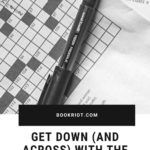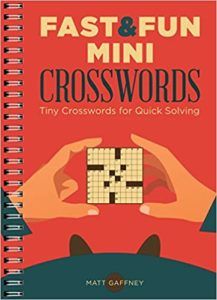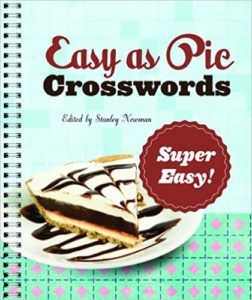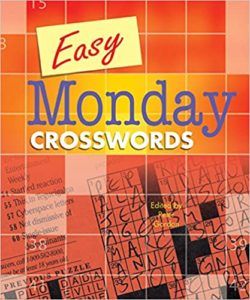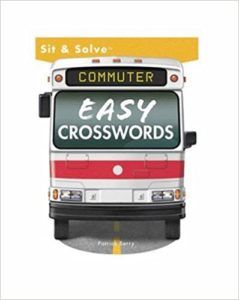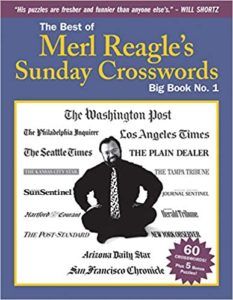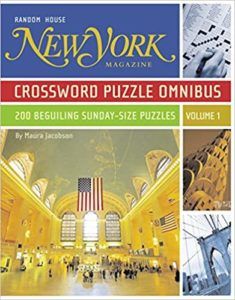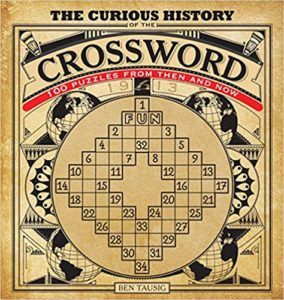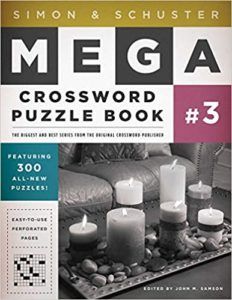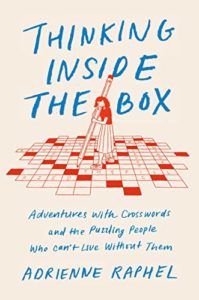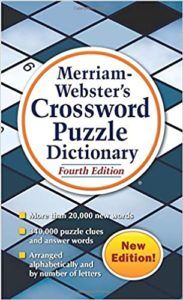Crossword puzzle books are a perfect way to get into cruciverbalism. We all need activities that get us away from screens and devices. Working through all the puzzles in a book is the analog version of completing all the levels in a video game. So let’s wear down some pencils.
Getting to Know Your Puzzles
Crosswords come in generic and artisanal varieties. The books you can often find among the magazines at grocery stores likely have puzzles that were generated almost entirely without human hands and minds. Computers can scour dictionaries for words to fill a given grid, then populate the puzzle with standard clues for each word. They are technically puzzles, but a thin gruel at best. The artisanal varieties are written by real humans! The grid may be filled by hand or with the aid of computers, and the clues are as original as can be. There are, of course, only so many ways to clue some of the words, like OLEO and EPEE, that show up in crosswords a lot due to the patterns of the English language. But crossword constructors put real humanity into what they write, imbuing the puzzles with their own sense of wordplay, humor, and pop culture sensibilities. Many constructors incorporate themes into their puzzles. Themes arise from the long answers scattered throughout the puzzle that have a uniting element, ranging from puns, spoonerisms, homophones, and more. Ultimately, this means that crossword solvers will develop tastes, the same way readers do with authors. Any puzzle worth its salt includes the puzzle constructor’s name, and taking note of names allows solvers to develop favorites. If you know any name associated with crossword puzzles, it’s likely to be Will Shortz, the editor (though not the constructor) of The New York Times crossword puzzle. There are heaps of crossword puzzle books from the Gray Lady that range from reliable to classic. You don’t need me to recommend them any more than you need me to tell you to check out that Shakespeare guy if you’re in the mood for a play.
The Puzzling Caveat
The other reason I’m skirting around The New York Times in my recommendations is because I think it’s worth shining the spotlight elsewhere. The world of crosswords and the Times puzzle in particular, like other realms historically dominated by straight white men, has come under increasing scrutiny for allowing bigotry to continue largely unchecked. This does also explain the relative dearth of racial, gender, and sexual diversity in the following list of crossword books. Change is afoot, but it’s slow. I want to also recognize the exciting things in the more indie crossword world, and encourage budding solvers to also check out the Inkubator, Queer Qrosswords, and Women of Letters. I also love the puzzles from The New Yorker and USA Today, both of which have diverse, exciting rosters of constructors who write fresh, fun puzzles. All that said, there are still countless great crossword books out there, perfect for a low-tech afternoon with a comfy seat and a sharp pencil.
Getting Started
Fast & Fun Mini Crosswords: Tiny Crosswords for Quick Solving
Start small! Matt Gaffney is a prolific and excellent constructor, who has brought puzzles to a small size if you’re strapped for time or just learning how crosswords work.
Easy as Pie Crosswords: Super Easy!: 72 Relaxing Puzzles
Puzzles are often given a day of the week to denote difficulty. Mondays are the easiest, Saturdays are the hardest, and Sundays are bigger than the rest. This book by Stanley Newman is set to Tuesday difficulty.
Easy Monday Crosswords
If Tuesdays are tough, you can always try a book of Monday-level crosswords edited by Peter Gordon.
Sit & Solve Commuter Easy Crosswords
If you’re looking for a book of puzzles you could actually fit in your pocket, try this book by Patrick Berry. If you like these, you’ll want to seek out more of his puzzles; he’s one of the greats!
Getting Thematic
Crasswords: The Enhanced Edition: Dirty Crosswords for Cunning Linguists
A great feature of crossword puzzle books is their ability to buck editorial standards requiring clean language in a newspaper or magazine. Francis Heaney took full advantage of that for his book of bawdy and irreverent puzzles.
Drunk Crosswords: Over 50 All-New Puzzles With a Twist
Brendan Emmet Quigley is one of my very favorite constructors in the game. I wouldn’t suggest actually being drunk to solve these puzzles. You will need your wits about you.
Food for Thought Crosswords
Erik Agard, the editor of the aforementioned USA Today crossword, is another absolute favorite constructor of mine. So far he has published one book of his original creations, all themed on food.
Classic Classics
The Best of Merl Reagle’s Sunday Crosswords: Big Book No. 1
Merl Reagle was a singular talent among crossword constructors and his funny Sunday-sized puzzles (meaning 21 squares by 21 squares as opposed to the daily size of 15 x 15) are prized by people looking to solve a larger grid and get to know a constructor whose sense of humor is clever, unexpected, and delightful.
New York Magazine Crossword Puzzle Omnibus, Volume 1
Maura Jacobson is another of the all-time greats. If you’ve seen the crossword documentary Wordplay (and if you haven’t, get on it!), you’ve seen footage from the annual American Crossword Puzzle Tournament. Maura’s puzzles were always gems at that competition, as were the puzzles she wrote for New York Magazine.
Appreciating History
The Curious History of the Crossword: 100 Puzzles from Then and Now
Ben Tausig runs the stellar crossword subscription service American Values Club Crossword and has also compiled a book to teach the history of the puzzle while solving puzzles.
Simon & Schuster Mega Crossword Puzzle Book #3
This line of crossword puzzle compendiums is a great way to get to know a variety of constructors. Simon & Schuster’s first ever published book was also the first ever published book of crossword puzzles, so these collections are keeping up with history.
New York Crosswords: 50 Big Puzzles
New York magazine has reliably great puzzles, but this book also captures an amazing piece of history: a cryptic crossword from the magazine’s first issue, written by Broadway living legend Stephen Sondheim. Cryptic crosswords are a style more popular in the UK than the U.S., and have their own idiosyncratic rules for cluing.
Bonus Content
Thinking Inside the Box: Adventures with Crosswords and the Puzzling People Who Can’t Live Without Them
There have been a number of nonfiction books published about the history of crosswords and crossword culture. This particular sub-genre got an update this year, with this new book about puzzle people by Adrienne Raphel.
Merriam-Webster’s Crossword Puzzle Dictionary
I truly believe in using internet searches or a crossword dictionary to solve. It’s not cheating; it’s learning. You’ll be amazed at how your reliance on outside help will diminish over time. Nonetheless, it’s dangerous to go alone. Take this!
